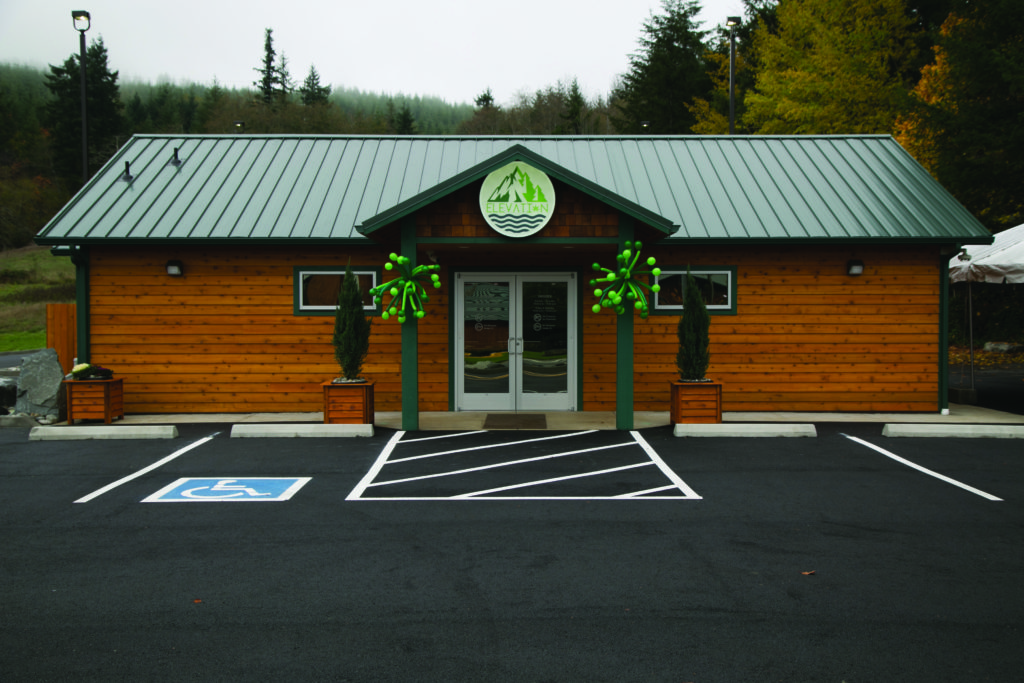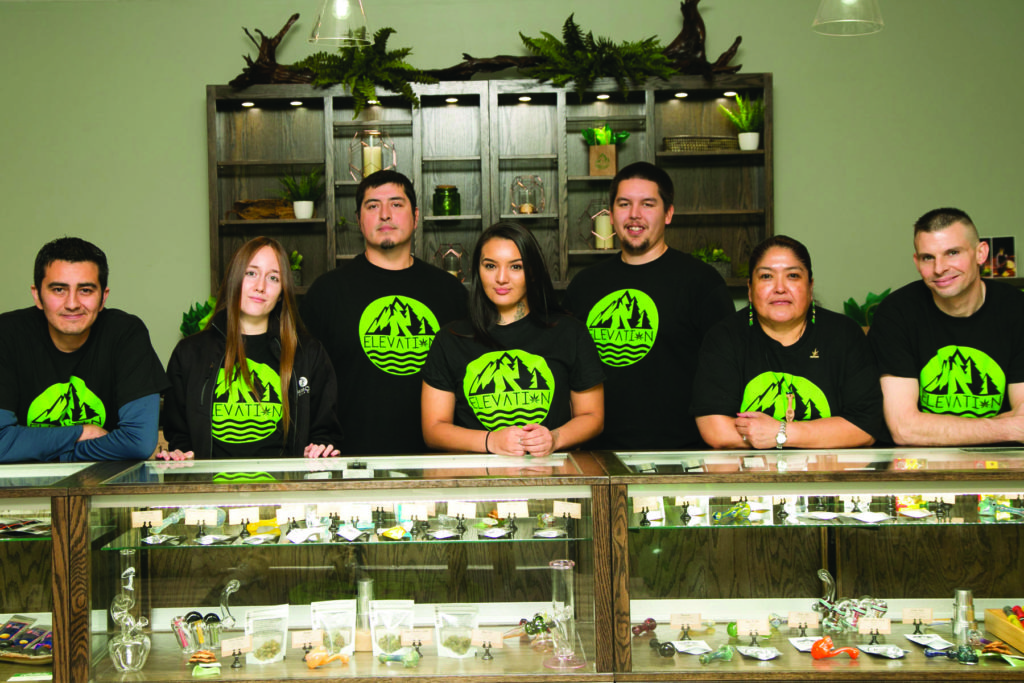Tribes mixed about joining the cannabis industry
By Sue Vorenberg
More than a year has passed since the Department of Justice announced that Native American tribes can legalize cannabis on their own lands — but so far, only a small handful of nations have decided to move forward.
So why are the majority of tribes waiting, watching and studying up before jumping into what could be an immense boon for economic development? One of the most pressing reasons is that tribes still have to follow federal guidelines and restrictions — and many have to work with the states that surround them, including those that don’t approve of legalized cannabis.
Tribes received the sovereign ability to ban or allow marijuana on their lands under the December 2014 tribal policy statement from the U.S. Department of Justice. That statement basically put tribes under the same guidelines that states use for legalization through the Cole Memorandum. Under the guidelines, tribes must prevent distribution to minors, keep marijuana away from federal lands, prevent drugged driving and stop transportation of marijuana to neighboring states where cannabis is banned.
There are also a multitude of legal issues stemming from the federal classification of cannabis as a Schedule 1 drug, putting tribes in the same boat as states when it comes to the perils of legalization, said Blake Trueblood, business development director for the National Center for American Indian Enterprise.

In essence, many tribes simply don’t have the money or the expertise to move forward in an uncertain regulatory situation.
“This stuff could all change overnight,” Trueblood said. “There’s room for economic opportunity, but you also have to be comfortable with that risk. One of the most important things for tribes, if they decide to do this, is to find the right partners. You don’t want to get involved with people who don’t know what they’re doing or who only want to make money off of you.”
Still, despite the challenges, some tribes have waded into the cannabis industry.
The Santee Sioux
The Flandreau Santee Sioux tribe in South Dakota planned to open what would have been the first marijuana resort in the United States on New Year’s Eve of 2015.
The tribe was working with a Denver contractor, Monarch America, to design, construct and develop a 10,000-square-foot grow facility to supply a 15,000-square-foot retail marijuana lounge next to the tribe’s Royal River Casino and Hotel.
The deal, signed in June 2015, was structured so the tribe paid for construction of the facility, while Monarch America collected consulting and management fees for running the day-to-day operations.
Because South Dakota doesn’t currently allow marijuana for recreational or medicinal uses, the tribe received pushback from state officials, including Attorney General Marty Jackley, who suggested that any non-tribal members who consumed marijuana on the reservation could still face prosecution under state law.
In November 2015, tribal members voted to put the project on hold and torch its existing crop that had been planted in September.
“For a tribe in a state with no legal marijuana whatsoever, that presents a significant challenge,” Trueblood said.
The Department of Justice’s tribal policy statement did not give the tribes broad autonomy regarding marijuana.
“Studying this, I think there’s an incredible misconception that tribes can unilaterally legalize,” said Lael Echo-Hawk, a tribal attorney with Hobbs, Straus, Dean & Walker in Washington, D.C.
If a tribe is in a state that’s considering legalization, Echo-Hawk said it’s a good idea to discuss options with legislators and make sure they’re included in the process.
“What I’m advising tribes to do is make sure there’s some room for them to participate,” Echo-Hawk said.
Trueblood said he thinks it’s a smart play to get together with state officials to address their concerns.
“The local and state authorities don’t have direct control over what the tribe does, but they can lean on the U.S. attorney for that district and try to stop the tribe from moving forward,” Trueblood said. “Even though you don’t have to be on the same page with state regulators, it’s very wise to involve them in the process so there really are no secrets.”
Still, the Santee Sioux haven’t completely given up on the project.
Members are meeting with state and federal officials to resolve any issues so plans can once again move forward, tribal leaders said.
“This suspension is pivotal to the continued success of the marijuana venture, and tribal leadership is confident that after seeking clarification from the United States Department of Justice, it will be better suited to succeed,” Flandreau Santee Sioux attorney Seth C. Pearman said in a press release. “The tribe will continue to consult with the federal and state governments, and hopes to be granted parity with states that have legalized marijuana. The tribe intends to successfully participate in the marijuana industry, and tribal leadership is undaunted by this brief sidestep.”
If successful, the resort could net the tribe up to $2 million a month, according to estimates by the tribe.
The resort would also meet a need that states with recreational cannabis have struggled with, by creating a legal public space where consumers can use marijuana together.
That’s one of the fascinating aspects of tribal legalization — it has the potential to get around some of the issues that are snagging state legalization, said Dave Rheins, CEO of the Marijuana Business Association.
“One of the problems with legalization, whether you’re in Denver or Seattle or Portland, is that you can’t consume publicly,” Rheins said. “That’s really a challenge. So if you have a destination like this, it’s a big positive, like a Disneyland for dope. You can see the potential.”
The Washington Approach
In Washington state, where both medical and recreational cannabis are legal, two tribes have joined the market and started their own retail stores.
Their efforts were fostered by the first ever state-tribal marijuana compact, which was signed in September 2015 by officials from the state Liquor and Cannabis Board, Governor Jay Inslee and Suquamish Tribal Chairman Leonard Forsman. Later that month, the state signed the nation’s second state-tribal marijuana compact with the Squaxin Island Tribe.
The compacts set structures and rules for the tribes, which pave the way for them to produce, process and sell marijuana to state residents.
“This is similar to other compacts we’d negotiate on fuel or anything else,” said Brian Smith, a spokesman for the Liquor and Cannabis Board. “We have compacts with two tribes, and we work with them on compliance checks. But the tribes also take on a lot of the enforcement role themselves.”
According to the agreements, the tribes charge an excise tax that’s equivalent to the state excise tax for marijuana products in order to prevent unfair competition — but the tribes get to keep their taxes for tribal economic development.
“Our tribe always favors a collaborative and cooperative approach,” Forsman said in a press release. “We believe that our relationship with the State, including this compact, will best serve and protect our tribal community, surrounding neighbors, and residents of the state.”
The Squaxin Island Tribe opened the state’s first tribal retail store, Elevation, in Shelton in November 2015.
Squaxin Island Tribal Council member Jim Peters said the tribe was very cautious about moving forward into the cannabis industry. Peters said the entire community and tribal council had mixed feelings, but ultimately decided it was an opportunity that couldn’t be missed.
“If you had asked me two years ago about us having a marijuana store, I would have said no,” Peters said. But Peters, like other members of the tribal council, slowly came around as they educated themselves about cannabis and the potential for tax revenue to have a positive impact within the community.
The conversation about cannabis-related businesses opportunities initially began among tribal council prior to the passage of Initiative 502 in 2012. But after voters of the state approved the measure to legalize recreational marijuana, it became a part of every council meeting, Peters said.
The Squaxin Island Tribe eventually decided to open a retail store as a low-cost, low-risk way of getting a foot into the cannabis industry, compared to the capital expense of a grow operation or processing facility. However, the possibility of someday becoming vertically integrated remains open, Peters said.
“We’re the type of tribe that when we do something, we want to do it right,” he said. “We don’t want to make major mistakes and have to start things over because we didn’t really think it out, or we didn’t get the right people to get us going.”
The excise tax collected from retail sales at Elevation will go toward tribal law enforcement, addiction treatment facilities, education programs, health care, day care and programs for elders, while also creating job opportunities for tribal members.
The tribe’s education program is a particularly important beneficiary of cannabis revenue, Peters said. The tribe’s goal is to pay for higher education for all interested tribal members.
“At some point in time, this venture will allow us to pay almost 100% of their schooling,” Peters said.
It’s too early to know for certain, but Peters said Elevation seems to be meeting its financial projections.
“We will know more after the one-year anniversary,” he said.
The Suquamish Tribe opened Washington’s second tribal retail store, Agate Dreams, in December 2015, in Poulsbo.
Store manager Calvin Medina said sales have been strong since opening.
“We’ve been pretty well received from the general public,” Medina said. “And (tribal members) are glad that the taxes stay around here.”
The stores sell product from state-licensed producers and processors operating under Washington’s recreational marijuana system and governed by the Liquor and Cannabis Board.
Eventually, the Suquamish Tribe may decide to vertically integrate and grow its own marijuana crop, but for now those plans are on hold while the tribe and the state work out some of the regulatory kinks.
Washington state companies are banned from vertical integration — meaning stores can’t grow and sell their own marijuana.
However, tribes don’t have that same restriction.
“Not only can we become a grower, but we can also be a retailer,” Medina said. “That’s how the compact went.”
The fact that the state was willing to enter into compacts with the tribes is highly commendable, and hopefully it bodes well for tribes in other states with legal recreational cannabis, Trueblood said.
“Here’s a state that recognizes the opportunity and wants to participate, and wants to allow everybody to participate,” Trueblood said. “That’s very encouraging.”
The Puyallup Tribe of Indians is the most recent nation to join the cannabis industry. In January, the tribe announced it will be opening a marijuana testing laboratory, which will be located at a building in Fife that currently houses a cancer treatment center.
The testing lab will offer safety and potency tests to state-licensed marijuana producers and processors.
Opportunities, Opportunities
Tribes could meet another pressing need from legal states by setting up their own credit unions or banking institutions, Rheins said.
Cash-strapped tribes may not be able to do that entirely on their own, but many are actively looking for partners to help them launch new cannabis businesses, Trueblood said.
“There’s a public perception that all tribes have casinos, and all tribes are rich,” Trueblood said. “The reality is very far from that. There are tribes that have successful gaming operations, but the majority of tribes really have no economic opportunities available. So here we have an industry that tribes can participate in, but it’s not an easy road.”
On the corporate side, there’s no shortage of interest from consulting groups and investors that want to partner with tribes.
That’s evident even just looking at the growing number of Native American panel discussions on the cannabis convention circuit, Trueblood said, adding that he participated in panel discussions about tribal marijuana at the last two conventions he attended.
“It’s a hot topic and it’s not going away,” Trueblood said.
The willingness of businesses to partner with tribes is something that Rheins has seen as well.
“For businesses, I don’t see a lot of worry about partnering with tribes. I think they see it more as an opportunity,” Rheins said. “If you’re a cannabrand, you look at the state you’re in, and you have different levels of regulation. And there’s a thought that you may be able to more broadly participate in the industry by working with tribes.”
Some of the areas where tribes need the most help include branding and marketing expertise, land development and technological skills, Rheins said.
“I see the tribes eventually becoming an equal part and partner in this economy as everything develops,” Rheins said.
Competition?
As tribes continue to look at their options, cannabis retail operations in surrounding states are eyeing them as possible competition, but many stores are also interested in working with them.
“If a tribe were to grow cannabis, we’d use the same criteria we use for everybody else we deal with,” said Jim Mullen, chief operating officer at The Herbery in Vancouver, Washington. “That would be the quality of the product and the price point. However, everything would have to be approved by the LCB first, so the state would have to come up with some protocols.”
Brad Zusman, owner of Canna Daddy’s dispensary in Portland, Oregon, said he’s all for native nations participating in the green rush.
“I think it’s a free country, and they have the right to come into this industry the same as anybody else,” Zusman said.
Dozens of tribes in various states have expressed interest. Oregon could be the next state to feature a tribal cannabis operation.
The Confederated Tribes of Warm Springs overwhelmingly voted in favor of a referendum that would “allow, regulate and operate an on-reservation, tribally owned cannabis cultivation and extraction facility, with retail sales allowed only off the reservation,” according to a Bend Bulletin story.
The referendum reportedly drew a record turnout, with 86% of voters in favor.
The marijuana operation is expected to feature a 36,000-square-foot greenhouse, which would be operated by Warm Springs Ventures, the business arm of the Warm Springs tribes. Ventures would partner with Utah-based consulting company Strainwise, which has a joint operating agreement in place with Sentinel, a financial services firm. First-year profits are projected at $12 million, and the tribes expect profits of up to $26 million by year two.
“We knew that we wanted to participate in the native space in some fashion with cannabis; Sentinel-Strainwise was created as an entity for this exact purpose,” Strainwise associate director Chris Hardiman told the Bend Bulletin.
The greenhouse will cost $4.3 million, with the tribes contributing about $1.8 million of that, and Sentinel-Strainwise puting up the rest. Sampson said the cannabis operations will create much-needed jobs for tribal members.
Zusman said he likes the Washington solution in which tribes collect excise taxes, because it maintains a level playing field.
“So long as they’re not undercutting everybody, there’s really no problem,” Zusman said.
Morgan Hutchinson, co-owner of High End Market Place, another Vancouver retail store, said she also welcomes tribes into the cannabis business fold.
“If it benefits the tribes, that’s great,” Hutchinson said. “It wouldn’t affect us much anyway — and if the rules work for us to do business with tribes and they have the standards in place, I think we’d absolutely do business with them.”






